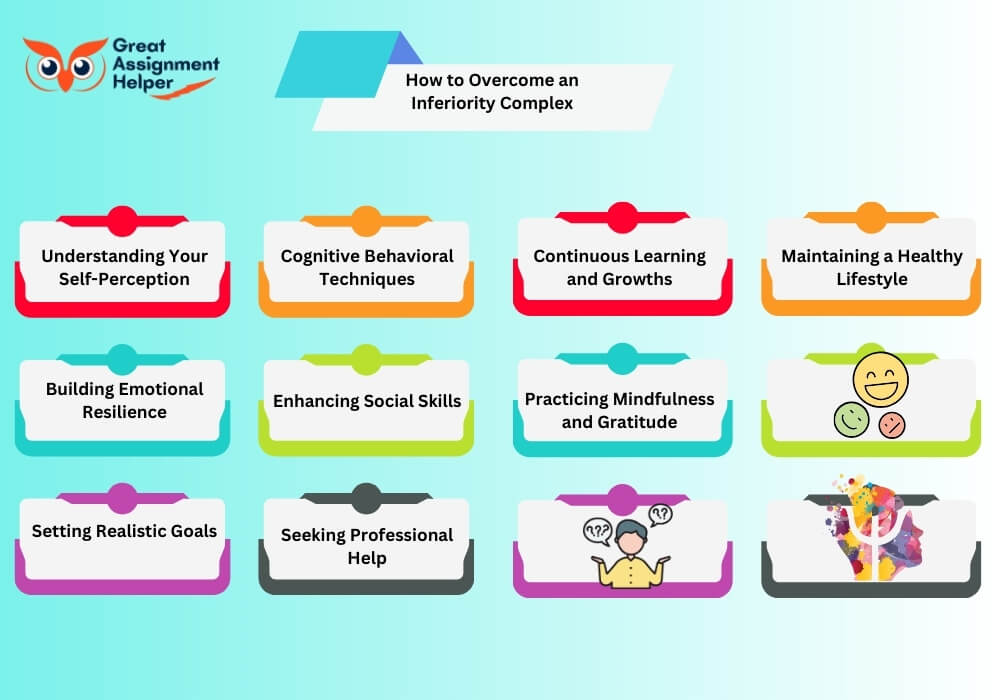
Listen To This Blog
Understanding Inferiority Complex
Inferiority complex, a term deeply rooted in psychological discourse, refers to an overwhelming feeling of not measuring up to others standards or expectations. This complex, often emerging from a blend of real and perceived inadequacies, can significantly impact an individuals self-esteem and overall mental health. Its a phenomenon that transcends mere self-doubt, embedding itself into the psyche and influencing behavior, relationships, and personal growth. In this exploration, we delve into the intricacies of inferiority complex, unraveling its causes, manifestations, and the pathways to overcoming its grip on ones life. Our journey through this topic aims to provide not just understanding but also practical strategies for those grappling with these challenging feelings.
Inferiority Complex: A Comprehensive Definition
Inferiority complex is a psychological condition characterized by persistent feelings of inadequacy and a lack of self-esteem, often stemming from comparing oneself unfavorably to others. This condition can significantly impact an individuals emotional well-being and daily functioning.
Core Elements of Inferiority Complex
1. Perceived Inadequacy: Central to the inferiority complex is the belief that one is less capable, attractive, successful, or worthy compared to others. This perception often does not align with reality and is rooted in the individuals subjective feelings.
2. Comparison and Self-Evaluation: Individuals with an inferiority complex frequently engage in negative self-evaluation, constantly measuring themselves against others and focusing on their perceived shortcomings.
3. Impact on Behavior and Relationships: This complex often leads to behaviors like social withdrawal, overcompensation, and in some cases, aggressive tendencies in interpersonal relationships.
4. Origins and Development: The roots of an inferiority complex can often be traced back to early life experiences, including family dynamics, academic pressures, and social interactions. These experiences shape the individuals self-perception and self-worth.
5. Psychological and Emotional Consequences: Living with an inferiority complex can lead to a range of emotional and psychological challenges, including anxiety, depression, and a pervasive sense of unhappiness.
Overcoming Inferiority Complex
While an inferiority complex can be deeply ingrained, it is not insurmountable. Therapy, self- reflection, and a conscious effort to build self-esteem can help individuals overcome these feelings and lead a more fulfilling life. In summary, an inferiority complex is a psychological state marked by feelings of inadequacy and low self-esteem, often resulting from unfavorable comparisons with others. It affects behavior, emotional well-being, and interpersonal relationships, but with the right approach, it can be addressed and managed effectively.
Inferiority Complex Psychology: A Comprehensive Overview
The concept of an inferiority complex is deeply rooted in psychological studies. It refers to an individuals persistent feeling of inadequacy, often stemming from childhood experiences and reinforced by societal pressures and personal comparisons.
Origins and Development
- Historical Perspective: The term was first introduced by Alfred Adler, a prominent figure in the field of psychology.
- Childhood Experiences: Early life experiences, such as excessive criticism, failure, or comparison with others, often lay the groundwork for these feelings.
The Role of Self-Perception
How individuals perceive themselves plays a crucial role in the development and persistence of an inferiority complex.
Factors Influencing Self-Perception
- Social Comparisons: Measuring oneself against peers, family members, or societal standards.
- Personal Achievements and Failures: How successes and setbacks are internalized and interpreted.
Manifestations in Behavior
An inferiority complex can significantly influence a persons behavior and interactions with others.
Behavioral Indicators
- Avoidance of Social Situations: Withdrawing from interactions due to feelings of inadequacy.
- Overcompensation: Engaging in behaviors aimed at proving ones worth or masking feelings of inferiority.
- Sensitivity to Criticism: A heightened reaction to feedback, viewing it as a reinforcement of inadequacy.
Psychological Impact
The complex affects not just behavior but also the mental and emotional well-being of individuals.
Emotional Consequences
- Low Self-Esteem: Persistent feelings of not being good enough.
- Anxiety and Depression: Mental health issues can arise from long-standing feelings of inferiority.
Strategies for Overcoming Inferiority Complex
Addressing and overcoming an inferiority complex requires a multifaceted approach.
Effective Approaches
- Cognitive Behavioral Therapy (CBT): This therapy helps in restructuring negative thought patterns.
- Self-Compassion and Acceptance: Learning to accept oneself and practicing self-kindness.
- Building Self-Efficacy: Engaging in activities that build confidence and a sense of achievement.
Conclusion
An inferiority complex is a deep-seated psychological issue that can have far-reaching effects on an individuals life. Understanding its roots, manifestations, and the strategies for overcoming it is crucial for psychological well-being and personal growth.
Classifications of Inferiority Complex
| Type | Description |
| Primary Inferiority Feeling |
Rooted in early childhood experiences, this type involves feelings of weakness, helplessness, and dependency, often intensified by comparisons with siblings, peers, or adults. |
| Secondary Inferiority Feeling |
Emerges in adulthood, linked to the inability to reach subconscious, idealistic goals, leading to feelings of inadequacy and failure. |
| Social Inferiority | Involves feelings of being socially inadequate, often triggered by social interactions and comparisons with others in social settings. |
| Intellectual Inferiority |
Centers around perceived intellectual shortcomings, where individuals feel less intelligent or less capable in academic or intellectual pursuits compared to their peers. |
| Physical Inferiority | Focuses on perceived physical limitations or flaws, where individuals feel inferior due to their physical appearance, abilities, or health compared to others. |
Each type of inferiority complex has its unique triggers and manifestations, and understanding these can be crucial in addressing and overcoming these feelings.
Understanding the Symptoms of Inferiority Complex
Inferiority complex, a term deeply rooted in psychological studies, manifests through various behaviors and feelings. Recognizing these symptoms is crucial for addressing and overcoming the complex. Below are the key symptoms, each with its own subpoints for a clearer understanding.
Demeaning Others
- Belittling Peers: To boost self-esteem, individuals might belittle others achievements.
- Overcritical Behavior: Exhibiting a critical attitude towards others successes or efforts.
Blaming External Factors
- Externalizing Failure: Attributing personal failures to external circumstances like luck or environment.
- Denial of Personal Responsibility: Reluctance to acknowledge personal mistakes or shortcomings.
Sour Grapes Attitude
- Discrediting Others Success: Rationalizing others; successes as mere luck or trivial.
- Minimizing Achievements: Downplaying the significance of others accomplishments.
Lack of Sportsmanship
- Avoidance of Competition: Shying away from competitive situations due to fear of comparison.
- Negative Reaction to Loss: Exhibiting poor sportsmanship when faced with defeat.
Extreme Sensitivity
- Sensitivity to Criticism: Overreacting to criticism or taking benign comments personally.
- Doubting Compliments: Questioning the sincerity of compliments received.
Seeking Attention
- Attention-Seeking Behaviors: Engaging in actions to draw attention, like exaggerating problems.
- Fishing for Compliments: Regularly seeking reassurance through compliments.
Fear of Making Mistakes
- Avoidance of New Challenges: Hesitating to try new things due to fear of failure.
- Perfectionism: Setting unrealistically high standards to avoid making mistakes.
Recognizing these symptoms is the first step towards addressing an inferiority complex. Its important to approach these signs with understanding and empathy, whether observing them in oneself or others.
How to Overcome an Inferiority Complex

Overcoming an inferiority complex involves a multifaceted approach that taps into various aspects of self-awareness, cognitive restructuring, and behavioral changes. Here is a guide to help you navigate through this process:
Understanding Your Self-Perception
- Reflect on Self-Image: Begin by introspecting how you view yourself. Are your thoughts predominantly negative or self-critical?
- Identify Triggers: Recognize situations or interactions that intensify feelings of inferiority.
Cognitive Behavioral Techniques
- Challenge Negative Thoughts: When you catch yourself with a negative thought, question its validity and replace it with a more balanced perspective.
- Affirmations and Positivity: Regularly practice positive affirmations that reinforce your self- worth.
Building Emotional Resilience
- Embrace Imperfections: Accept that imperfection is a part of being human. Learning from mistakes is more important than not making any.
- Develop Coping Strategies: Find healthy ways to deal with stress and anxiety, such as meditation, exercise, or hobbies.
Enhancing Social Skills
- Improve Communication: Work on your communication skills to express yourself more confidently.
- Seek Supportive Relationships: Surround yourself with people who uplift and support you.
Setting Realistic Goals
- Small Achievements: Set small, achievable goals to build confidence.
- Celebrate Successes: Acknowledge and celebrate your achievements, no matter how small.
Seeking Professional Help
- Therapy: Consider therapy, such as cognitive-behavioral therapy (CBT), which can be particularly effective in addressing inferiority complexes.
- Group Support: Join support groups where you can share experiences and learn from others.
Continuous Learning and Growth
- Educate Yourself: Read books or attend workshops that focus on self-improvement and personal growth.
- Be Open to Feedback: Constructive feedback can be a valuable tool for personal development.
Maintaining a Healthy Lifestyle
- Physical Activity: Regular exercise can boost your mood and self-esteem.
- Balanced Diet: A healthy diet can have a positive impact on your mental well-being.
Practicing Mindfulness and Gratitude
- Mindfulness Exercises: Engage in mindfulness practices to stay present and reduce negative thinking.
- Gratitude Journaling: Regularly write down things you are grateful for to shift focus from negatives to positives.
Conclusion
Overcoming an inferiority complex is a journey of self-discovery and growth. It requires patience, persistence, and often, a willingness to seek help when needed. Remember, the goal is not to become perfect but to become comfortable and confident in who you are.
Final Word
In summary, the exploration of the inferiority complex, a significant psychological phenomenon, underscores the intricate interplay between early life experiences and our mental health. This comprehensive analysis not only deepens our understanding of the psychological underpinnings of such complexes but also offers practical strategies for overcoming them. For students delving into the realms of psychology, these insights are particularly valuable, enhancing both academic and personal growth. For those seeking further assistance, especially in academic contexts, Great Assignment Helper & emerges as a reliable resource. Offering specialized psychology assignment help, this service provider stands out with its expertise in catering to the nuanced needs of psychology students. Whether its grappling with complex theories or applying them in practical scenarios, their support can be a game-changer in your educational journey. With their guidance, navigating the intricacies of psychology becomes not just manageable but also enriching, paving the way for academic excellence and deeper psychological understanding.


Social Withdrawal